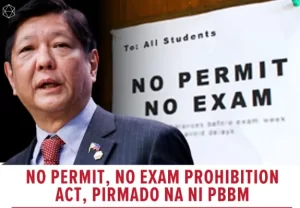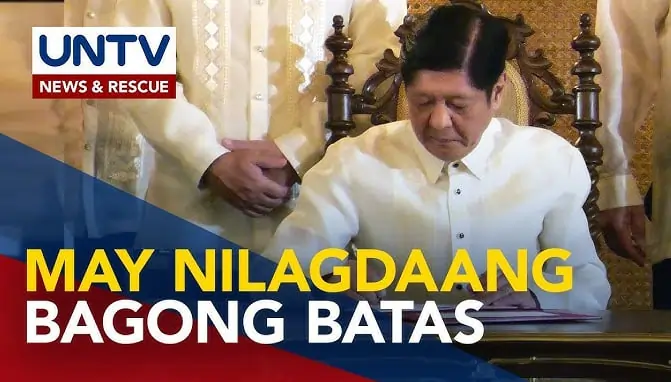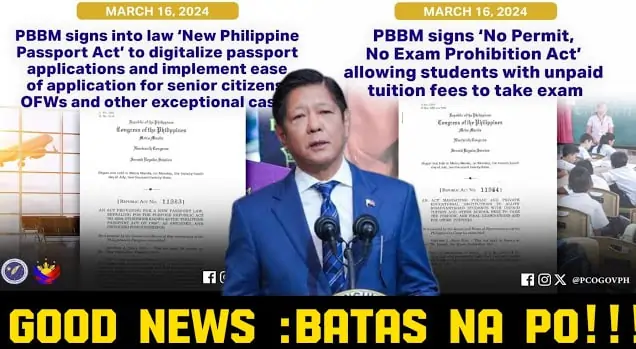No Permit No Exam Act | Pres. Marcos Implemented #1 Best Law

Students who have not yet paid their tuition fees will now be able to take periodic and final exams after President Ferdinand R. Marcos Jr. signed Republic Act 11984 or the ‘No Permit, No Exam Prohibition Act’ on March 11.
Table of Contents
Introduction to the No Permit No Exam Act
The “No Permit No Exam Act” (Republic Act 11984) is a significant legislative measure enacted in the Philippines aimed at addressing issues related to students’ access to education and examinations.
This act prohibits educational institutions from withholding students’ right to take periodic and final exams due to unpaid tuition or other school fees.
The law signifies a crucial step towards ensuring equitable access to education and promoting students’ rights in the educational system.
Key Provisions of Republic Act 11984
- Prohibition of Exam Withholding: Under this law, educational institutions are prohibited from denying students the opportunity to take exams solely based on non-payment of tuition or other school fees.
- Scope of Coverage: The act applies to all students enrolled in both public and private educational institutions across the Philippines.
- Penalties for Violation: Educational institutions found violating this law may face sanctions and penalties imposed by the Department of Education or Commission on Higher Education.
Background and Rationale Behind the Law
The enactment of Republic Act 11984 stemmed from the recognition of financial barriers hindering students’ access to education. Many students were unfairly prevented from taking exams due to outstanding fees, which directly affected their academic progress and overall educational outcomes. This law aims to promote social justice by ensuring that students are not deprived of their right to take exams, regardless of their financial circumstances.
The Signing of the “No Permit, No Exam Act” by President Ferdinand Marcos

On March 11, amidst a backdrop of educational reform and student advocacy, President Ferdinand R. Marcos Jr. signed into law Republic Act 11984, popularly known as the “No Permit No Exam Act.” This historic event marked a significant milestone in the Philippines’ education landscape, aiming to address the longstanding issue of students being barred from taking exams due to unpaid tuition fees.
The Context of Educational Challenges
The signing of Republic Act 11984 came at a crucial time when many Filipino students faced financial barriers that impeded their academic progress. Across the nation, reports surfaced of students being denied the opportunity to sit for exams simply because they could not afford to pay their tuition fees.
This practice not only hindered students’ educational journeys but also perpetuated social inequities by limiting access to academic advancement based on economic status.
Advocacy and Legislative Action
The journey towards enacting the “No Permit No Exam Act” was propelled by a groundswell of advocacy from students, educators, and civil society organizations.
Prior to the law’s passage, student groups and education advocates tirelessly campaigned for policies that would safeguard students’ rights to education irrespective of their financial circumstances.
This advocacy resonated deeply with lawmakers, who recognized the urgent need for legislative action to address this systemic injustice.
Deliberations and Public Support
In the halls of the Philippine Congress, deliberations surrounding Republic Act 11984 echoed the sentiments of the Filipino populace.
Members of both the Senate and the House of Representatives engaged in spirited discussions on the bill’s provisions, emphasizing the importance of upholding students’ rights and ensuring equitable access to education.
Public support for the legislation surged as citizens rallied behind the principle that education should be a fundamental right accessible to all, regardless of economic background.
The Signing Ceremony
The historic signing ceremony of Republic Act 11984 took place in Malacañang Palace, the official residence and workplace of the President of the Philippines.
President Ferdinand R. Marcos Jr., flanked by key legislators and education officials, addressed the nation in a televised event that underscored the significance of the new law.
In his address, President Marcos emphasized the government’s commitment to fostering a fair and inclusive education system that prioritizes the welfare of Filipino students.
Impact and Implications
With the stroke of a pen, President Ferdinand R. Marcos Jr. transformed the educational landscape of the Philippines. The enactment of the “No Permit No Exam Act” ushered in a new era of educational equity and social justice.
Students rejoiced at the prospect of no longer being disenfranchised from their right to academic advancement due to financial constraints.
Educational institutions, too, embraced the law’s provisions, recognizing the importance of fostering a supportive environment that prioritizes students’ educational pursuits over financial considerations.
Future Directions and Continued Advocacy
As the “No Permit No Exam Act” takes root within the fabric of Philippine education, ongoing efforts are underway to ensure its effective implementation and enforcement.
Government agencies, educational institutions, and civil society organizations collaborate to monitor compliance with the law and address any challenges that may arise.
Additionally, the passage of Republic Act 11984 has spurred further advocacy for comprehensive educational reforms aimed at dismantling systemic barriers to learning and fostering an education system that truly empowers every Filipino student.
Impact on Students and Educational Institutions

Impact on Students
- Enhanced Access to Education: Students from economically disadvantaged backgrounds benefit significantly by being able to take exams even if they have unpaid fees.
- Reduced Stress and Anxiety: Students experience less stress and anxiety related to financial obligations impacting their ability to progress academically.
- Improved Academic Performance: With the removal of exam barriers, students can focus better on their studies, potentially improving their academic performance.
Impact on Educational Institutions
- Administrative Challenges: Educational institutions must adapt their administrative processes to comply with the law, including ensuring fair treatment of all students.
- Financial Management: Institutions may need to review their financial policies to mitigate the impact of unpaid fees while upholding students’ exam rights.
Implementation Guidelines and Compliance
To effectively implement Republic Act 11984, the Department of Education and Commission on Higher Education issued guidelines to educational institutions. These guidelines specify the procedures and responsibilities of schools in complying with the law, ensuring that students’ rights are upheld while maintaining institutional integrity.
Benefits of the No Permit No Exam Policy
- Promotes Equity and Inclusion: The policy promotes equal access to education, irrespective of financial status, thereby fostering inclusivity in the educational system.
- Protects Students’ Rights: Students’ right to education and academic progression is protected, preventing arbitrary denial of exam opportunities.
- Supports Academic Achievement: By removing financial barriers, students can focus on their studies and achieve better academic outcomes.
Challenges and Controversies
Challenges
- Financial Strain on Institutions: Schools may face financial challenges due to unpaid fees, impacting their operational budgets.
- Enforcement and Compliance: Ensuring full compliance with the law across diverse educational institutions poses implementation challenges.
Controversies
- Debate on Financial Accountability: Some argue that non-payment of fees undermines the financial sustainability of educational institutions, creating debates around responsible financial behavior.
Success Stories and Case Studies
Several success stories and case studies highlight the positive impact of Republic Act 11984 on students’ lives and educational institutions. These narratives underscore the importance of equitable access to education and the transformative effect of policies that prioritize students’ rights and academic advancement.
Pros and Cons of the No Permit, No Exam Act
Pros:
- Enhanced Access to Education: The law ensures that financial constraints do not hinder students from taking exams, promoting equal educational opportunities.
- Reduced Academic Stress: Students can focus on their studies without the added pressure of financial barriers affecting their exam eligibility.
- Promotes Fairness: It prevents discrimination against students based on economic status, fostering inclusivity in educational institutions.
Cons:
- Impact on Educational Institutions: Some institutions may face financial challenges if tuition fees remain unpaid, affecting their operational budgets.
- Potential Abuse: Students might take advantage of the policy, leading to increased unpaid fees and financial strain on educational providers.
- Administrative Burden: Schools may encounter administrative complexities in managing unpaid fees while complying with the Act.
Positive and Negative Feedbacks on the No Permit, No Exam Act
Positive Feedbacks:
- Student Appreciation: Students appreciate the law for providing them with exam opportunities despite financial hardships.
- Improved Retention Rates: The Act contributes to higher student retention rates by allowing students to continue their education without interruptions.
Negative Feedbacks:
- Financial Challenges for Institutions: Educational institutions express concerns about the financial implications of the law on their operations.
- Enforcement Issues: Some institutions struggle with enforcing the Act while maintaining financial stability.
Conclusion
Republic Act 11984, known as the “No Permit No Exam Act,” is a landmark legislation that underscores the Philippines’ commitment to promoting equitable access to education and safeguarding students’ rights.
By prohibiting the withholding of exams due to unpaid fees, this law contributes to a more inclusive and just educational system, benefiting students and educational institutions alike. However, challenges such as financial strain and compliance issues underscore the need for ongoing monitoring and support to ensure the law’s effective implementation and positive impact.
Frequently Asked Questions (FAQs)
What is the No Permit, No Exam Act?
- The No Permit, No Exam Act (Republic Act 11984) is a law in the Philippines that prohibits educational institutions from barring students from taking exams due to unpaid tuition fees.
When was the No Permit No Exam Act signed into law?
- President Ferdinand Marcos signed the No Permit, No Exam Act into law on March 11,2024 .
Who does the No Permit No Exam Act benefit?
- This law primarily benefits students who struggle to pay tuition fees, ensuring they have the opportunity to take exams regardless of financial constraints.
Why was the No Permit No Exam Act implemented?
- The law was implemented to promote equitable access to education and prevent discrimination against students based on their financial status.
What are the key provisions of the No Permit No Exam Act?
- The Act prohibits educational institutions from withholding exam permits due to unpaid fees and ensures that students can take exams upon meeting academic requirements.
Are there any exceptions to the No Permit No Exam policy?
- The law exempts students who have committed academic misconduct or violated school regulations from its protections.
How does the No Permit No Exam Act impact educational institutions?
- Educational institutions are required to comply with the law and adjust their policies to align with the prohibition on barring students from exams due to unpaid fees.
Can students still be held accountable for unpaid tuition fees under the No Permit No Exam Act?
- Yes, students remain responsible for
settling unpaid fees, but the Act ensures that financial issues do not impede their academic progress or exam participation.
How is the No Permit No Exam Act enforced?
- The Act is enforced through monitoring by educational authorities and disciplinary actions against institutions that violate its provisions.
What other reforms complement the No Permit No Exam Act in improving education access?
- The implementation of this Act is often accompanied by initiatives to enhance scholarship programs, financial aid, and educational subsidies to further support students in need.
Advertisement


Nel Wiesenberg is a multifaceted individual known for his diverse career as a technical writer, author, and former professional poker player. His journey in the world of gambling began with a decade-long stint as a professional poker player before transitioning into technical writing. Wiesenberg’s contributions to the gambling community are extensive, having written for various publications over the years.
During his tenure as a professional poker player, Wiesenberg made a significant impact on the industry. He wrote for the original Gambling Times magazine, focusing on keno and poker, showcasing his expertise in these games. Additionally, he had regular columns in publications such as Poker Player and Pan Player +, a magazine catering to Panguingue players. Wiesenberg’s writing extended beyond gambling, with contributions to Dr. Dobb’s Journal, a computer magazine, and A+, a magazine for Apple computer users. His articles also appeared in publications like PC Publishing, Micro Times, Infoworld, and more.